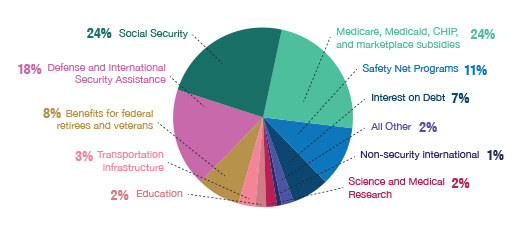What Do Your Taxes Pay For?
In 2014, as in recent years, Americans will spend more on taxes than on groceries, clothing, and shelter combined. In fact, we worked until mid-April just to earn enough money to pay our taxes. So what do all those weeks of work get us?1
Tip: Mid May. If the government had raised taxes enough to cover the budget deficit, we would have had to work until May 14 just to cover the tax bill.
Source: Tax Foundation, 2012
The accompanying chart breaks down the $3.5 trillion federal budget for 2014 into major categories. By far, the biggest category is Social Security and income programs, which consume one-third of the budget. This includes Social Security, retirement and disability programs for federal employees, food assistance, and unemployment compensation. Another 17% of the budget goes to defense and related items, and 26% goes to Medicare and health programs.2
Fast Fact: In the Hole. In fiscal 2014, the federal government is expected to spend $514 billion more than it collects in revenue. The government borrows the funds it needs to cover this shortfall by selling Treasury securities and savings bonds.
Source: Congressional Budget Office, 2014
Are taxes one of your biggest budget items? Take steps to make sure you’re managing your overall tax bill. Please consult a tax professional for specific information regarding your individual situation.
Pieces of the Federal Pie
Roughly 67% of the 2014 Federal budget will be used for Social Security, Medicare, defense, and related programs.

Source: Congressional Budget Office, 2014
Itemized Federal Spending
Here’s a breakdown of how the Federal budget was spent, according to categories established by the Congressional Budget Office.
| Social Security | 22% |
| Medicare, Medicaid, and CHIP | 21% |
| Defense and International Security Programs | 19% |
| Safety Net Programs | 12% |
| Interest on Debt | 6% |
Source: Center on Budget and Policy Priorities, 2013
- Tax Foundation, 2013
- Congressional Budget Office, 2014
The content is developed from sources believed to be providing accurate information. The information in this material is not intended as tax or legal advice. It may not be used for the purpose of avoiding any federal tax penalties. Please consult legal or tax professionals for specific information regarding your individual situation. This material was developed and produced by FMG Suite to provide information on a topic that may be of interest. The opinions expressed and material provided are for general information, and should not be considered a solicitation for the purchase or sale of any security. Copyright 2014 FMG Suite.




